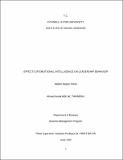Please use this identifier to cite or link to this item:
http://hdl.handle.net/11547/5206Full metadata record
| DC Field | Value | Language |
|---|---|---|
| dc.contributor.author | ABU AL TARABISH, Ahmed Ismail | - |
| dc.date.accessioned | 2019-12-02T08:42:49Z | - |
| dc.date.available | 2019-12-02T08:42:49Z | - |
| dc.date.issued | 2015 | - |
| dc.identifier.uri | http://hdl.handle.net/11547/5206 | - |
| dc.description.abstract | This research which titled (Effects of Emotional Intelligence on Leadership behavior) aims to identifying the effect of the emotional intelligence on the foundation universities leaders (academic and executive staff) behavior and how it shapes their ability to lead and influence their teams to achieve organizational objectives and their ability to mobilize efforts of staff. It aims at identifying the different variables and competencies needed for effective leadership. This research adapted the Traits emotional intelligence model of Petrides with its four components well-being, self-control, empathy, and sociability and their effects on the leadership style as defined by the full range leadership theory. The research also aims at identifying the differences between respondents as attributed to their personal and professional traits gender, age, academic qualifications, and years of experience, years working under the supervision of the manager, grade, and span of control. The researcher adapted a descriptive analytical approach which depends on data collection, analysis using SPSS and interpretation of the results to determine the hypothesized relationships. An internationally accepted measurement tools were adapted, translated, and modified to suit the purpose of the study. The questionnaire was distributed to a sample of 200 staff working in these foundation universities to collect the necessary data for the study. The results of the study supported the hypothesized relationships of the existence of significant relationship between emotional intelligence of leaders and their leadership style. The relationship provides to exist at all scales and subscales of the emotional intelligence construct except with transactional leadership on part of its components (management by exception (active). A significantly 2 negative relationship was also proved to exist between emotional intelligence and laissez faire leadership style. The results also proved that there are no significant differences among respondents attributed to the personal and professional traits of gender, age, academic qualifications, and years of experience, grade and supervisory capacity. The research has presented some recommendations concerning the application of emotional intelligence at the workplace and some other recommendations for future research. The recommendations include increasing awareness of the emotional intelligence concept and its importance and application among the leadership and supervisory roles. It also recommends the design and implementation of appropriate training programs for leaders on how to consider and apply emotional intelligence traits in their personnel management. The research also recommends developing tools to measure the level of emotional intelligence and inter and intra personal skills and incorporate it into the recruitment of potential leaders. | tr_TR |
| dc.language.iso | en | tr_TR |
| dc.publisher | İSTANBUL AYDIN ÜNİVERSİTESİ SOSYAL BİLİMLER ENSTİTÜSÜ | tr_TR |
| dc.title | EFFECTS OF EMOTIONAL INTELLIGENCE ON LEADERSHIP BEHAVIOR | tr_TR |
| dc.type | Thesis | tr_TR |
| dc.description.abstractol | Araştırma duygusal zekânın, özel üniversitelerin liderlerinin davranışlarına etkisini belirlemek, liderlerin kendi takımlarının organizasyon amaçlarına varmaları ve personelleri motive etmek için gösterdikleri çaba, etkinlik gibi yeteneklerine nasıl etki etmesini belirlemek amacı taşıyor. Başarılı lider olmak, gerekli olan farklı değişkenlikleri ve yetenekleri belirlemek amacı taşır. Bu araştırma Pedrides’in Kişisel duygusal zeka modelinin sağlıklı olmak, irade, empati, sosyallik gibi adımlarına adapte olmuştur. Onların etkinliği tam liderlik alanı teorisi ile belirleniyor. Araştırma, ayrıca özel, profesyonel cinsiyetine, yaşına, akademik becerilerine, tecrübe zamanına, kendi yöneticisi altında çalıştığı zamana, derecesine, kontrol kapsamına göre nitelenen davalar arasındaki farklılıkları belirliyor. Araştırma tanımlayıcı analitik yaklaşıma adapte olmuştur ve bu yaklaşım hippyetik ilişkileri belirleyen bilgi kazanmasına, SPSS kullanan analize, sonuçların yorumlanmasına bağlıdır. Uluslararası kabul edilmiş ölçüm araçları araştırmanın amacına uyum sağlamak icin adapte edilmis, yorumlanmis ve degiştirilmiştir. Gerekli bilgileri almak icin bu özel üniversitede çalisan 200 personele anket dağitilmiştır. Araştirma sonucu liderlerin duygusal zeka ve liderlik tarzı arasindaki önemli iliskinin var olmasi icin hipotetik iliskiyi desteklemiştir. Işlem liderliğinin kendi hisseleri arasindaki ilişkilerden başka, duygusal zekanin tüm derecelerinde kendini gösteriyor. Ayrica duygusal zeka ve laissez faire liderlilik arasinda negatif iliskinin olmasi kanitlanmiştir. Ayrica sonuclar kişisel ve profesyonel cinsiyetine, yaşina,akademik becerilerine, tecrube zamanina, derecesine, kontrol kapsamina gore nitelenen davalar arasinda büyük bir farkliligin olmamasini kanitladi. Araştirma iş yerinde duygusal zekanin uygulanmasi endişeleri ve gelecek araştirma icin bazi tavsiyelerde bulunmuştur. Tavsiyeler duygusal zeka teorisi icin farkindaliğin artmasini, önemliligini ve yöneticilik rollerinin uygulanmasini içeriyor. Ayrica liderlere duygusal zeka teorisini kendi yönetimlerine uygulamak icin uygun egitim programinin seçimini tavsiye ediyor. Araştirma duygusal zekanin seviyesini ve kişisel becerilerini ölçmek icin gelişmiş araçlarin uygulanmasini ve bundan potensiyel liderlerin ise alımında uygulanmasini tavsiye ediyor. | tr_TR |
| dc.publisher.firstpagenumber | 1 | tr_TR |
| dc.publisher.lastpagenumber | 117 | tr_TR |
| dc.identifier.bibliographictag | ABU AL TARABISH, Ahmed Ismail, EFFECTS OF EMOTIONAL INTELLIGENCE ON LEADERSHIP BEHAVIOR(2015), İSTANBUL AYDIN ÜNİVERSİTESİ SOSYAL BİLİMLER ENSTİTÜSÜ | tr_TR |
| Appears in Collections: | Tezler -- Thesis | |
Files in This Item:
| File | Description | Size | Format | |
|---|---|---|---|---|
| 10083084.pdf | 1.6 MB | Adobe PDF |  View/Open |
Items in DSpace are protected by copyright, with all rights reserved, unless otherwise indicated.
